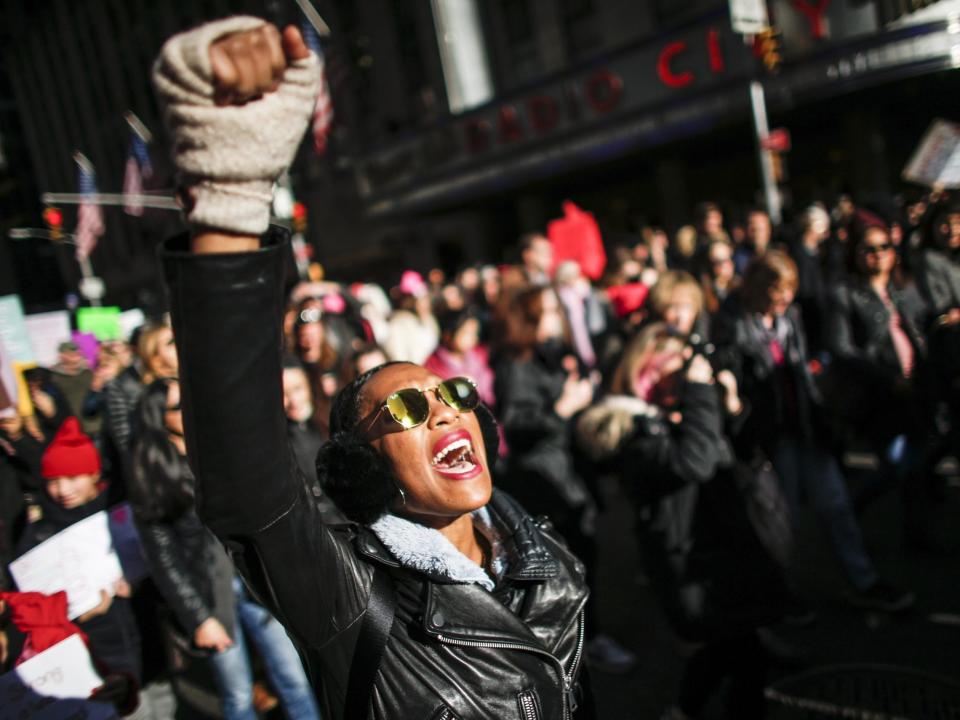‘It’s a rallying cry to challenge power and oppression’: Why we still need the Women’s March in 2020

The Women’s March has been an annual tradition since 2017. But what began as a protest against the newly inaugurated US president Donald Trump has evolved into a major global event.
This year, on Saturday 18 January, marches are expected to take place around the globe, with events in Portugal, Germany, Belgium, and across the US, where a flagship march will take place in Washington DC.
In the UK, organisers of the Women’s March have joined forces with The Equality Trust and the event will be held as part of the Fight Inequality Alliance’s global protests, which will see thousands of people march in more than 30 countries, such as Chile and Ecuador.
The protests are being held ahead of next week’s World Economic Forum in Davos, where nearly 3,000 world leaders from 118 countries are expected to gather and discuss key global issues, such as the climate crisis.
Participants are calling for a number of measures, including good quality education, accessible housing and an end to poverty wages.
Instead of an actual march, this year's London event will take the form of a static rally that will see participants meeting at Richmond Terrace at 12noon.
Roughly 200 people are expected to attend, which is notably less than in previous years, but organisers say the Woman's March is no less significant this year. In fact, it's needed more than ever.
“The political climate is even more divided and complex than it was three years ago,” says Dr Wanda Wyporska, Executive Director, The Equality Trust.
“Women all over the globe are most hard hit by inequality in all its forms and we need to bring our voices to the forefront of this debate, as women are leading the fight back," Wyporska tells The Independent.
"Protests against rising inequality are expected to take place in over 30 countries, including the United Kingdom, the Philippines, Zambia, Kenya, India, Zimbabwe, Pakistan, South Africa, Mexico and Uganda. The January protest will see diverse movements joining together against the root causes of inequality and call for systemic change."
The theme for the event is Speaking to Power, which Wyporska explains refers to challenging the leaders meeting in Davos next week and urging them to combat global inequality.
"We are saying to governments that we the people have the solutions to inequality, not the elites," she adds. "But it's also a rallying cry for everyone to challenge power and oppression wherever they find it, in our daily lives, in our workplaces, in our societies and to question decision makers, policy makers and others."
In terms of specific issues that participants in tomorrow's march would like those in Davos to address, Wyporska references the gender pay gap and women bearing the brunt of the last decade of cuts by becoming trapped in poorly paid jobs.
Only 2 days to go- ARE YOU COMING?
See you all at Whitehall, London at 12pm this Saturday 18 Jan 2020 and lend your voice to global protests against inequality!!
✊🏼✊🏼✊🏼 @FightInequality @equalitytrust @womensmarchgbal @womensmarch https://t.co/ROtcZvYTm3— Women's March London (@womensmarchlon)
"Women have always borne the brunt of most inequality and women have always been on the front lines of fighting it," she continues. "Inequality, bigotry and fear are more prevalent than ever before and we need a strong, grassroots driven, intersectional feminist movement to fight that.
"As women, we often have to fight for space and platforms on which we can be heard, so it's vital to have a common moment of solidarity when we can all come together."
For more information about tomorrow's event, click here.

 Yahoo News
Yahoo News 